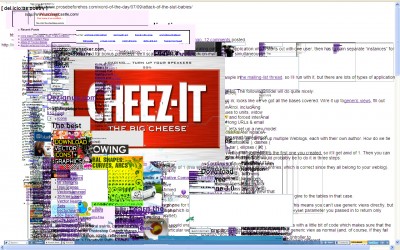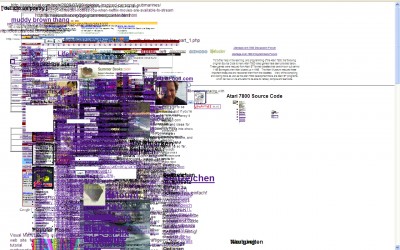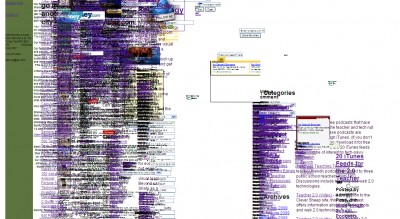I once again reactivated the delicious poetry piece. It hasn’t been working in a while because delicious.com’s website had changed its web page structure, but now it’s back up.
You can see it by clicking this [ LINK ] (WARNING: it may hang your browser!)
delicious poetry grabs internet’s faourite links in realtime and uses their contents to visually build a chaotic poem. An everchanging complex composition built on people’s wishes, desires, tastes and emotions.
Generative art has been known to research on multiple subjects: from reconsidering the role of artists and authors, to researching into the structures of language, to the analysis of natural phenomena, to deep diving into code, chaos and complexity, up to the uplifting experiences brought on by discovering noise and randomness as primary creative energies.
delicious poetry grabs handfuls of enjoyment from all of this, and adds to it a little joke i constantly try to play to internet service providers and to search engines. A small, playful critique to the mechanisms they use to scan the web to provide us with the things we constantly are looking for. And, obviously, a small critique to the trust that we tend to put on them, as well.
In fact, something funny happened in the past with delicious poetry. The generative poems composed by the work produce pages that are a dynamic assemblage of the things that internet users deem as being interesting at a certain time. This is why search engines and content aggregators seem to find these chaotic poems so interesting, finding them completely filled with the “hot” keywords of the moment. So much that they tent to spider, cache, index, rate and categorize them.
The first time I released delicious poetry I was actually amazed. A few days after it started out, it began to generate thousands of human and not-human visits per day! And aggregators started to categorize it under the most incredible topics, ranging from pornography to gadgets to cars… and on.
I guess there are hundreds of automatic mechanisms people use to fool search engines. And this has helped me to take interest on more than one issue related to search angines and to the accessibility of web content: the invisible web, the Dark Internet.
On one side, the tons of useless results that we get when we search for stuff on the web. On the other side, the fact that “Internet” does not mean “automatically accessible”, for reasons that go beyond the power of single individuals, and referring to the fact that search engines do not index a lot of things, or that censorhip exists, and more like that. (note: entire web search engines are dedicated to the deep web. DeepDyve and DeepPeep, to name two).
Even web statistics and analytics are affected by delicious poetry, getting referral codes, analytics codes and statistics application hooks used in ways that are different than the ones they were intended for, hijacking entre websites’ access statistics.
I naturally meant no harm or damage in doing this, but knowing that it is possible to fake, to mock-up, to reinvent what we know about the web, its accessibility, its control, is just plain interesting in itself.
![[ AOS ] Art is Open Source](https://www.artisopensource.net/network/artisopensource/wp-content/uploads/2020/03/AOSLogo-01.png)


